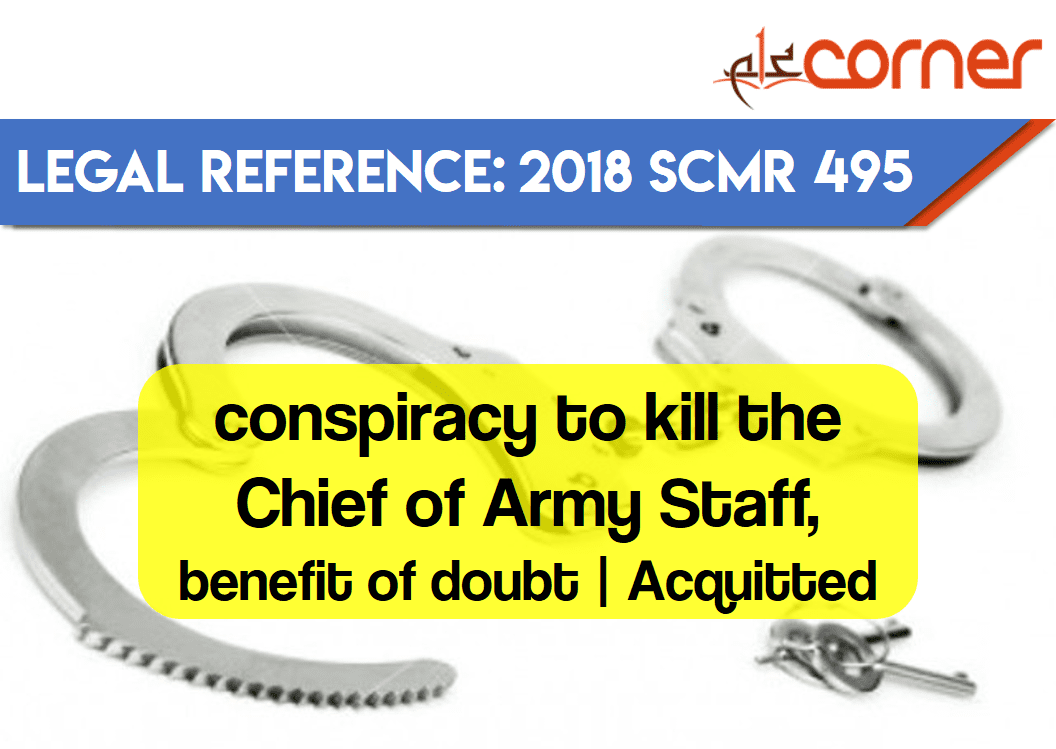2018 S C M R 495
[Supreme Court of Pakistan]
Present: Asif Saeed Khan Khosa, Dost Muhammad Khan and Mazhar Alam Khan Miankhel,
JJ
INTEKHAB AHMAD ABBASI and others—Appellants/Petitioners
Versus
The STATE and others—Respondents
(a) Penal Code (XLV of 1860)—
—-Ss.120-B, 420, 468 & 471—Anti-Terrorism Act (XXVII of 1997), S. 7—Explosive Substances
Act (VI of 1908), Ss. 4 & 5—Possessing explosives to carry out terrorist activities—Re-appraisal of
evidence—Benefit of doubt—Accused persons were alleged to have hatched a conspiracy to kill the
Chief of Army Staff but before they could execute their plan they were arrested from a parking lot and
upon the search of their vehicles explosive material was found therein—Arrest of the accused persons
from the parking lot appeared to be doubtful—Large contingent of police raided the parking lot,
surrounded it from all four corners and during the arrest, recovery and seizure proceedings not a
single public witness was associated—Even the owner of the car park, caretaker/manager and
particularly the watchman, who was deputed for looking after parked vehicles was not available as
witness—Police contingent remained on the crime scene for many hours but none of them was
available as witness—Register maintained for the entries about the parked vehicles and its particulars
was not taken into possession rather it was arranged after many days—Said register contained lose
sheets, blank pages and some sheets were half filled—Courts below had rightly discarded said
primary piece of evidence—Accused persons suffered many injuries during their custody which
raised the inference that they were tortured—Potassium chloride recovered from the accused persons
became a high intensity explosive substance only after being mixed with certain other substances,
therefore, question was as to whether potassium chloride on its own could be termed as a high
intensity explosive substance—Within no time after the arrest of the accused persons ‘murasla report’
was sent for registration of the case and S. 120-B, P.P.C. was also inserted therein, when by then, the
accused were neither interrogated nor they had disclosed about the place, time where they hatched the
conspiracy—Offence under S. 120-B, P.P.C., thus, remained unestablished—Question as to how the
accused persons knew about the layout plan and about the location of the office of the Chief of Army
Staff when no map or guideline materials were recovered from them, was another lacuna in the
prosecution case—Accused persons allegedly made confessions before the Special Magistrate,
however before such confessions the accused remained in the custody of the investigating agency for
weeks—Magistrate gave the accused persons only half an hour time to re-think and re-compose about
the making of confession—Fair inference could be drawn that the accused persons were coerced and
pressurized to make confessions after remaining in the custody of a Joint Investigation Team for many
weeks at unknown places—Confessions thus procured by the Special Magistrate besides being
irregular, had lost judicial efficacy and legal worth—Admittedly some of the accused were illiterate or
not well educated and spoke a language that the Magistrate could not understand—No
translator/interpreter was appointed to record their statements in the words exactly spoken by them—
Further the report of concerned Authority about the forged identity cards allegedly recovered from the
accused persons was not brought on record at the trial to prove the charge of forgery—Evidence
furnished by the prosecution was full of factual and legal defects and was bereft of legal
worth/judicial efficacy, therefore, no reliance could be placed on the same—Accused persons were
acquitted of all the charges levelled against them by extending them the benefit of doubt—Appeals
were allowed accordingly.
(b) Anti-Terrorism Act (XXVII of 1997)—
—-S. 7—Explosive Substances Act (VI of 1908), Ss. 4 & 5—Possessing explosives to carry out
terrorist activities—Suggestions and recommendations given by the Supreme Court for effective
investigation of terrorism cases and for prevention of such crimes recorded.
